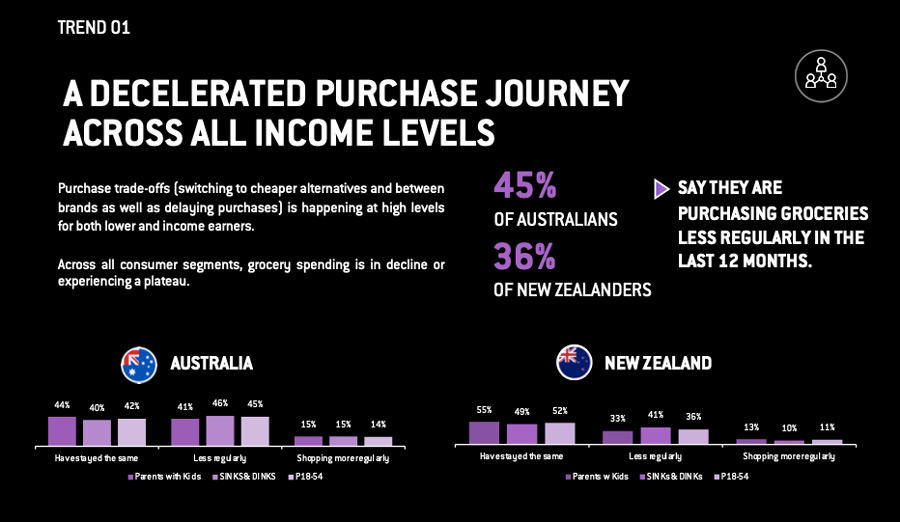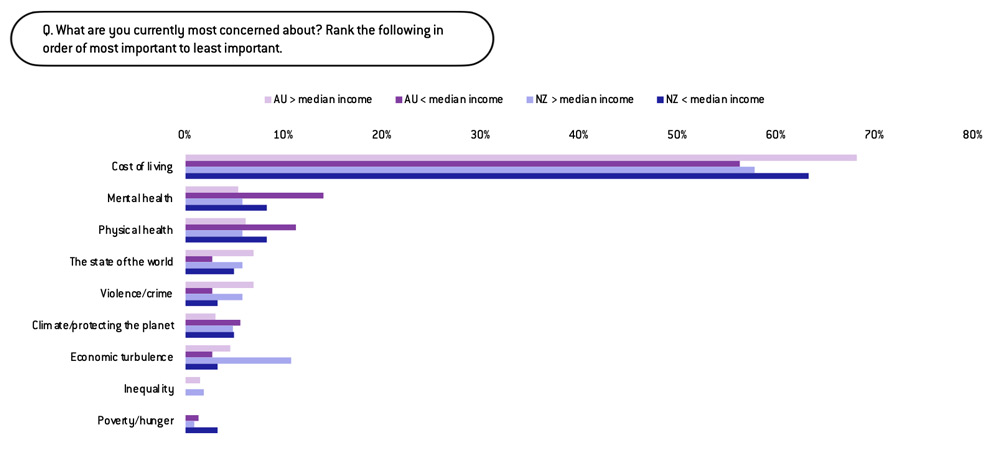AUCKLAND, Today: New research shows high brand switching rates across all income levels in New Zealand and Australia. The typical retail journey is also taking longer due to the cost-of-living crisis.
Consumers are spending more time seeking out ‘value for money’ and better deals. The study by Mediahub, called The New Value Economy, reveals three in five people in NZ are switching to cheaper products or delaying purchases.
“This research could not have come at a better time. Many New Zealand brands and businesses across most sectors and categories are doing it tough right now.
“For many, it is a war of attrition. It has allowed us to have many informed and valuable conversations with brands to help them navigate the current climate and shape strategies to redefine their value to budget-conscious Kiwis,” says Hugo Winter, GM Mediahub NZ.
Linda Fagerlund, Chief Strategy Officer at Mediahub ANZ, says the shift in consumer behaviour is challenging NZ brands to adapt quickly. “Understanding consumer behaviour and discretionary spend across retail categories, across income levels and consumer life stage segments is imperative for brand survival in the face of a worsening economic downturn.”
“This research could not have come at a better time. Many New Zealand brands and businesses across most sectors and categories are doing it tough right now.” – Hugo Winter
“That’s why we’ve undertaken this study; to provide a deeper understanding of ANZ’s current retail landscape and the social, economic and cultural dynamics at play affecting consumers, and how brands and marketers need to adjust to drive growth.”
The study shows purchase trade-offs at both low and high-income levels. “The pinch is clearly being felt across all demographics, resulting in purchase deceleration across the board from high end/luxury brands to mid-range and lower-cost brands. This is a pattern of consumer behaviour that brands across all sectors need to be aware of,” Fagerlund notes.
Key findings
- ‘Value for money’ is driving purchase decisions with 54% of New Zealanders and 53% of Australians saying this is the most important factor when choosing a brand or product
- Across all consumer segments, grocery spending is in decline or experiencing a plateau, with 36% of New Zealanders and 45% of Australians saying they have purchased groceries less regularly over the past 12 months
- In New Zealand, 75% of high-income earners and 43% of low-income earners delayed purchase, and 51% of high-income earners vs 40% of low-income earners skipped a product purchase
- By contrast in Australia, 58% of higher income earners, and 56% of low-income earners delayed purchase of a product; with 40% of high-income earners and 51% of low-income earners opting to skip purchase of a product altogether due to cost-of-living pressures
“It’s a delicate balance. Ultimately, brands need to continually look to ways to reframe and communicate their value over and above just price and promotion.”
The study also reveals that 68% of Australians and New Zealanders view cost-of-living as their primary concern. Australians feel anxious yet optimistic, while New Zealanders see financial stress as their main issue.
Different age demographics influence emotions, with those under 35 feeling more optimistic and those over 35 more cautious. “Across Australia and New Zealand people are most concerned about issues closer to home, and in particular their mental health, which highlights the personal impact of the economy, and how it is threatening our traditional sunny cultural outlook on life.”
“Brands need to apply empathy and not shy away from the realities of the cost-of-living crisis and the anxious age we are living in, when planning how best to connect with their audiences, regardless of income,” Fagerlund adds.
- To read the full report and opportunities for brands, click here
Share this Post
The post Consumers are switching brands: What this means for you appeared first on M+AD!.


More Stories
5 Ways Brands Can Weather a Tariff Storm as Consumer Spending Shifts Toward Value
Creativity shines
Hilton Uses Social Listening to Showcase ‘Superior’ Stays